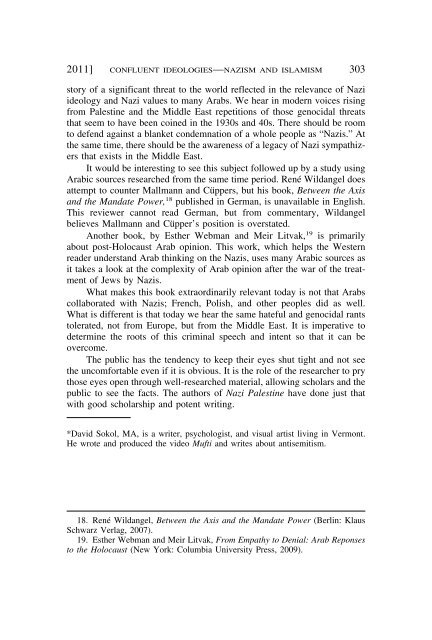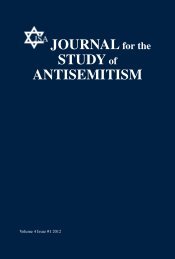- Page 1 and 2:
JOURNAL for the STUDY of ANTISEMITI
- Page 3 and 4:
Dedicated to those who perished in
- Page 5 and 6:
JSA Submission Guidelines The Journ
- Page 7 and 8:
Essays A French Intifada...........
- Page 10 and 11:
Special Issue: Latin American Antis
- Page 12 and 13:
A Note from the Editors There is cl
- Page 14:
2011] A NOTE FROM THE EDITORS 5 ple
- Page 17 and 18:
8 JOURNAL FOR THE STUDY OF ANTISEMI
- Page 19 and 20:
10 JOURNAL FOR THE STUDY OF ANTISEM
- Page 21 and 22:
12 JOURNAL FOR THE STUDY OF ANTISEM
- Page 23 and 24:
14 JOURNAL FOR THE STUDY OF ANTISEM
- Page 25 and 26:
16 JOURNAL FOR THE STUDY OF ANTISEM
- Page 28 and 29:
Antisemitic Incidents from Around t
- Page 30 and 31:
2011] ANTISEMITIC INCIDENTS FROM AR
- Page 32 and 33:
2011] ANTISEMITIC INCIDENTS FROM AR
- Page 34 and 35:
2011] ANTISEMITIC INCIDENTS FROM AR
- Page 36 and 37:
Mexico in a Region under Change Jud
- Page 38 and 39:
2011] MEXICO IN A REGION UNDER CHAN
- Page 40 and 41:
2011] MEXICO IN A REGION UNDER CHAN
- Page 42 and 43:
2011] MEXICO IN A REGION UNDER CHAN
- Page 44 and 45:
2011] MEXICO IN A REGION UNDER CHAN
- Page 46:
2011] MEXICO IN A REGION UNDER CHAN
- Page 49 and 50:
40 JOURNAL FOR THE STUDY OF ANTISEM
- Page 51 and 52:
42 JOURNAL FOR THE STUDY OF ANTISEM
- Page 53 and 54:
44 JOURNAL FOR THE STUDY OF ANTISEM
- Page 55 and 56:
46 JOURNAL FOR THE STUDY OF ANTISEM
- Page 57 and 58:
48 JOURNAL FOR THE STUDY OF ANTISEM
- Page 60 and 61:
Latin America and the Middle East:
- Page 62 and 63:
2011] THE POLITICAL BACKGROUND 53 E
- Page 64 and 65:
2011] THE POLITICAL BACKGROUND 55 a
- Page 66 and 67:
2011] THE POLITICAL BACKGROUND 57 a
- Page 68 and 69:
2011] THE POLITICAL BACKGROUND 59 d
- Page 70 and 71:
América Latina y el Oriente Medio:
- Page 72 and 73:
2011] EL TRASFONDO POLÍTICO 63 Ven
- Page 74 and 75:
2011] EL TRASFONDO POLÍTICO 65 Bol
- Page 76 and 77:
2011] EL TRASFONDO POLÍTICO 67 cio
- Page 78 and 79:
2011] EL TRASFONDO POLÍTICO 69 apo
- Page 80 and 81:
The New Judeophobia on the Left 1 P
- Page 82 and 83:
2011] THE NEW JUDEOPHOBIA 73 to oth
- Page 84 and 85:
2011] THE NEW JUDEOPHOBIA 75 Israel
- Page 86 and 87:
2011] THE NEW JUDEOPHOBIA 77 As we
- Page 88 and 89:
2011] THE NEW JUDEOPHOBIA 79 ism).
- Page 90 and 91:
2011] THE NEW JUDEOPHOBIA 81 reache
- Page 92 and 93:
2011] THE NEW JUDEOPHOBIA 83 expres
- Page 94 and 95:
2011] THE NEW JUDEOPHOBIA 85 of 2,9
- Page 96 and 97:
2011] THE NEW JUDEOPHOBIA 87 Europe
- Page 98 and 99:
2011] THE NEW JUDEOPHOBIA 89 . . .
- Page 100 and 101:
2011] THE NEW JUDEOPHOBIA 91 the ma
- Page 102 and 103:
2011] THE NEW JUDEOPHOBIA 93 that c
- Page 104 and 105:
2011] THE NEW JUDEOPHOBIA 95 agains
- Page 106:
2011] THE NEW JUDEOPHOBIA 97 “It
- Page 109 and 110:
100 JOURNAL FOR THE STUDY OF ANTISE
- Page 111 and 112:
102 JOURNAL FOR THE STUDY OF ANTISE
- Page 113 and 114:
104 JOURNAL FOR THE STUDY OF ANTISE
- Page 115 and 116:
106 JOURNAL FOR THE STUDY OF ANTISE
- Page 117 and 118:
108 JOURNAL FOR THE STUDY OF ANTISE
- Page 119 and 120:
110 JOURNAL FOR THE STUDY OF ANTISE
- Page 121 and 122:
112 JOURNAL FOR THE STUDY OF ANTISE
- Page 123 and 124:
114 JOURNAL FOR THE STUDY OF ANTISE
- Page 125 and 126:
116 JOURNAL FOR THE STUDY OF ANTISE
- Page 127 and 128:
118 JOURNAL FOR THE STUDY OF ANTISE
- Page 129 and 130:
120 JOURNAL FOR THE STUDY OF ANTISE
- Page 131 and 132:
122 JOURNAL FOR THE STUDY OF ANTISE
- Page 133 and 134:
124 JOURNAL FOR THE STUDY OF ANTISE
- Page 135 and 136:
126 JOURNAL FOR THE STUDY OF ANTISE
- Page 137 and 138:
128 JOURNAL FOR THE STUDY OF ANTISE
- Page 139 and 140:
130 JOURNAL FOR THE STUDY OF ANTISE
- Page 141 and 142:
132 JOURNAL FOR THE STUDY OF ANTISE
- Page 143 and 144:
134 JOURNAL FOR THE STUDY OF ANTISE
- Page 145 and 146:
136 JOURNAL FOR THE STUDY OF ANTISE
- Page 147 and 148:
138 JOURNAL FOR THE STUDY OF ANTISE
- Page 150 and 151:
Latin America and Iranian Terror Ne
- Page 152 and 153:
2011] TERROR NETWORKS 143 We should
- Page 154 and 155:
2011] TERROR NETWORKS 145 few days
- Page 156 and 157:
2011] TERROR NETWORKS 147 cell, had
- Page 158 and 159:
América Latina y las Redes del Ter
- Page 160 and 161:
2011] REDES DEL TERROR 151 velo mie
- Page 162 and 163:
2011] REDES DEL TERROR 153 durante
- Page 164 and 165:
2011] REDES DEL TERROR 155 Argentin
- Page 166 and 167:
Antisemitism in Brazil Alberto Milk
- Page 168 and 169:
2011] ANTISEMITISM IN BRAZIL 159 An
- Page 170 and 171:
2011] ANTISEMITISM IN BRAZIL 161 Ah
- Page 172 and 173:
2011] ANTISEMITISM IN BRAZIL 163 au
- Page 174 and 175:
2011] ANTISEMITISM IN BRAZIL 165 Da
- Page 176 and 177:
Una aproximación al tema de la int
- Page 178 and 179:
2011] ANTISEMITISMO EN BRASIL 169 d
- Page 180 and 181:
2011] ANTISEMITISMO EN BRASIL 171 c
- Page 182 and 183:
2011] ANTISEMITISMO EN BRASIL 173 L
- Page 184 and 185:
2011] ANTISEMITISMO EN BRASIL 175 L
- Page 186:
2011] ANTISEMITISMO EN BRASIL 177 S
- Page 189 and 190:
180 JOURNAL FOR THE STUDY OF ANTISE
- Page 191 and 192:
182 JOURNAL FOR THE STUDY OF ANTISE
- Page 193 and 194:
184 JOURNAL FOR THE STUDY OF ANTISE
- Page 195 and 196:
186 JOURNAL FOR THE STUDY OF ANTISE
- Page 197 and 198:
188 JOURNAL FOR THE STUDY OF ANTISE
- Page 199 and 200:
190 JOURNAL FOR THE STUDY OF ANTISE
- Page 201 and 202:
192 JOURNAL FOR THE STUDY OF ANTISE
- Page 203 and 204:
194 JOURNAL FOR THE STUDY OF ANTISE
- Page 205 and 206:
196 JOURNAL FOR THE STUDY OF ANTISE
- Page 208 and 209:
Israel’s Intent Yehuda Bauer* Wha
- Page 210:
2011] ISRAEL’S INTENT 201 perpetu
- Page 213 and 214:
204 JOURNAL FOR THE STUDY OF ANTISE
- Page 215 and 216:
206 JOURNAL FOR THE STUDY OF ANTISE
- Page 217 and 218:
208 JOURNAL FOR THE STUDY OF ANTISE
- Page 219 and 220:
210 JOURNAL FOR THE STUDY OF ANTISE
- Page 221 and 222:
212 JOURNAL FOR THE STUDY OF ANTISE
- Page 223 and 224:
214 JOURNAL FOR THE STUDY OF ANTISE
- Page 225 and 226:
216 JOURNAL FOR THE STUDY OF ANTISE
- Page 228 and 229:
Doing the Yale Flip-Flop Amitai Etz
- Page 230 and 231:
Arab Spring Sprung Fiamma Nirenstei
- Page 232:
2011] ARAB SPRING SPRUNG 223 cally
- Page 235 and 236:
226 JOURNAL FOR THE STUDY OF ANTISE
- Page 237 and 238:
228 JOURNAL FOR THE STUDY OF ANTISE
- Page 239 and 240:
230 JOURNAL FOR THE STUDY OF ANTISE
- Page 241 and 242:
232 JOURNAL FOR THE STUDY OF ANTISE
- Page 243 and 244:
234 JOURNAL FOR THE STUDY OF ANTISE
- Page 245 and 246:
236 JOURNAL FOR THE STUDY OF ANTISE
- Page 247 and 248:
238 JOURNAL FOR THE STUDY OF ANTISE
- Page 249 and 250:
240 JOURNAL FOR THE STUDY OF ANTISE
- Page 252 and 253:
Antisemitism in Wagnerian Opera 1 D
- Page 254 and 255:
2011] ANTISEMITISM IN WAGNERIAN OPE
- Page 256 and 257:
2011] ANTISEMITISM IN WAGNERIAN OPE
- Page 258 and 259:
2011] ANTISEMITISM IN WAGNERIAN OPE
- Page 260 and 261:
2011] ANTISEMITISM IN WAGNERIAN OPE
- Page 262 and 263: 2011] ANTISEMITISM IN WAGNERIAN OPE
- Page 264 and 265: 2011] ANTISEMITISM IN WAGNERIAN OPE
- Page 266 and 267: 2011] ANTISEMITISM IN WAGNERIAN OPE
- Page 268 and 269: 2011] ANTISEMITISM IN WAGNERIAN OPE
- Page 270: 2011] ANTISEMITISM IN WAGNERIAN OPE
- Page 273 and 274: 264 JOURNAL FOR THE STUDY OF ANTISE
- Page 276 and 277: Journal of Contemporary Leftist Ant
- Page 278 and 279: 2011] CONTEMPORARY LEFTIST ANTISEMI
- Page 280 and 281: Miral and International Efforts to
- Page 282 and 283: 2011] MIRAL AND DELEGITIMIZING ISRA
- Page 284 and 285: But Will It Sell in Islamabad? Tare
- Page 286 and 287: 2011] BUT WILL IT SELL IN ISLAMABAD
- Page 288: 2011] BUT WILL IT SELL IN ISLAMABAD
- Page 291 and 292: 282 JOURNAL FOR THE STUDY OF ANTISE
- Page 293 and 294: 284 JOURNAL FOR THE STUDY OF ANTISE
- Page 295 and 296: 286 JOURNAL FOR THE STUDY OF ANTISE
- Page 298 and 299: Analysis of the Pogrom Jonathan Dek
- Page 300: 2011] ANALYSIS OF THE POGROM 291 pe
- Page 303 and 304: 294 JOURNAL FOR THE STUDY OF ANTISE
- Page 305 and 306: 296 JOURNAL FOR THE STUDY OF ANTISE
- Page 307 and 308: 298 JOURNAL FOR THE STUDY OF ANTISE
- Page 309 and 310: 300 JOURNAL FOR THE STUDY OF ANTISE
- Page 311: 302 JOURNAL FOR THE STUDY OF ANTISE
- Page 315 and 316: 306 JOURNAL FOR THE STUDY OF ANTISE
- Page 318 and 319: . . . From the Conference Floor Mad
- Page 320 and 321: AIPAC Conference May 22-24, Washing
- Page 322 and 323: Antisemitica 313
- Page 324: 2011] ANTISEMITICA 315 Cartoons by
- Page 328: The UK’s University and College U














